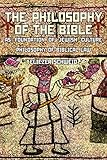The Philosophy of the Bible as Foundation of Jewish Culture : Philosophy of Biblical Law / Eliezer Schweid.
Material type: TextSeries: Reference Library of Jewish Intellectual HistoryPublisher: Boston, MA : Academic Studies Press, [2009]Copyright date: ©2009Description: 1 online resource (216 p.)Content type:
TextSeries: Reference Library of Jewish Intellectual HistoryPublisher: Boston, MA : Academic Studies Press, [2009]Copyright date: ©2009Description: 1 online resource (216 p.)Content type: - 9781934843529
- 9781618110480
- 221.6
- BS645 .S39213 2008
- online - DeGruyter
| Item type | Current library | Call number | URL | Status | Notes | Barcode | |
|---|---|---|---|---|---|---|---|
 eBook
eBook
|
Biblioteca "Angelicum" Pont. Univ. S.Tommaso d'Aquino Nuvola online | online - DeGruyter (Browse shelf(Opens below)) | Online access | Not for loan (Accesso limitato) | Accesso per gli utenti autorizzati / Access for authorized users | (dgr)9781618110480 |
Browsing Biblioteca "Angelicum" Pont. Univ. S.Tommaso d'Aquino shelves, Shelving location: Nuvola online Close shelf browser (Hides shelf browser)
Frontmatter -- Contents -- Preface -- The Complementarity of Law and Narrative -- Chapter 1. The Law of the Kingdom of God -- Chapter 2. Deuteronomy (the “Second Torah”) - The Beginning of Renewal of the Written Torah as Oral Torah -- Chapter 3. The Partnership of Man and Woman in the Law of Moses and the Prophets -- Chapter 4. Universalism and Particularism - Openness to Foreign Cultures, and Isolation from their Influence -- Index
restricted access online access with authorization star
http://purl.org/coar/access_right/c_16ec
Like Spinoza in his Theological-Political Treatise, Schweid helps us grasp the potential for seeing radically new messages in this oldest of books, the Bible. The American Founding Fathers realized that the Bible offers strong support for the doctrine of popular sovereignty. Socially, it offers a message of egalitarianism, especially in the provisions of the Jubilee. It is hardly an accident that two modern political movements found mottos ready at hand from the 25th chapter of Leviticus: “Proclaim liberty throughout the land unto all the inhabitants thereof” (engraved on the Liberty Bell), and “The land shall not be sold in perpetuity” (motto of the Jewish National Fund). Schweid helps us to appreciate the broader message of the narrative of creation and settlement of the land in its ecumenical and planetary dimensions. The world is God’s creation, and its resources are to be deployed as necessary for the sustenance and need-fulfillment of all peoples and all creatures equally—a message very much relevant to the ecological crisis facing us all at the present time.
Mode of access: Internet via World Wide Web.
In English.
Description based on online resource; title from PDF title page (publisher's Web site, viewed 01. Dez 2022)









